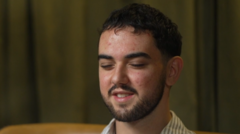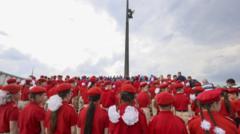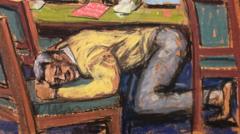Amid escalating reports of partying on rented buses leading to negative impacts on academics and social inclusivity, the Norwegian government is considering shifting graduation celebrations to the post-exam period.
Party Culture Under Scrutiny: Norway's School Leavers Face New Regulations

Party Culture Under Scrutiny: Norway's School Leavers Face New Regulations
The rising trend of excessive partying among Norwegian school leavers, known as russ, is sparking concerns from parents and officials as it coincides with the examination period.
Norwegian school leavers don colorful overalls and engage in a celebratory culture known as "russ," especially leading up to the national day on May 17. Traditionally, the celebrations coincide with exam periods, but many students have started partying weeks earlier, raising alarms among parents and authorities alike.
Selma Jenvin-Steinsvag and her peer Aksel run to catch the metro in their red overalls, marking their last weeks of school. However, such days are filled with parties often centered around russebuss—party buses where students revel throughout the night, enjoying loud music and alcohol. "It's just fun!" insists 19-year-old Edvard Aanestad, who indulges in the experiences alongside peers, but this carefree attitude stops short of acknowledging potential risks.
Concerns over excessive drinking, drug use, lack of sleep, and academic stress are mounting among parents and educators. Prime Minister Jonas Gahr Støre admits festivities have spiraled, with many parents emphasizing the impact that this culture has on younger teenagers. "It's now acknowledged that the russe culture has a huge impact on the school environment," says Solveig Haukenes Aase, a concerned parent.
Kari Nessa Nordtun, Norway's Minister of Education, highlights the intertwined nature of celebrations and the exam period, pointing out a decline in student performance correlating with partying. Efforts are in place to shift celebrations to post-exam periods to counteract social exclusion and high costs often associated with party buses, a sentiment echoed by other officials worried about the safety risks involved, such as dancing on buses during transport.
The tradition itself has morphed over the years, originally exclusive to elite schools but now widespread. While some groups budget as high as 3 million krone (£220,000) for their festivities, including renting top-notch sound systems, this raises questions of financial accessibility and inclusivity. Many students face financial burdens, often coming from selling toilet paper or dipping into savings to afford bus costs.
Young school leavers like Edvard argue that interventions from the government might instigate even more exclusion rather than alleviate it, stating, “This isn’t going to help tackle exclusion.” As discussions move forward, the focus is on creating a safer, more inclusive celebration for future graduating classes, but the road ahead appears fraught with contention.
Selma Jenvin-Steinsvag and her peer Aksel run to catch the metro in their red overalls, marking their last weeks of school. However, such days are filled with parties often centered around russebuss—party buses where students revel throughout the night, enjoying loud music and alcohol. "It's just fun!" insists 19-year-old Edvard Aanestad, who indulges in the experiences alongside peers, but this carefree attitude stops short of acknowledging potential risks.
Concerns over excessive drinking, drug use, lack of sleep, and academic stress are mounting among parents and educators. Prime Minister Jonas Gahr Støre admits festivities have spiraled, with many parents emphasizing the impact that this culture has on younger teenagers. "It's now acknowledged that the russe culture has a huge impact on the school environment," says Solveig Haukenes Aase, a concerned parent.
Kari Nessa Nordtun, Norway's Minister of Education, highlights the intertwined nature of celebrations and the exam period, pointing out a decline in student performance correlating with partying. Efforts are in place to shift celebrations to post-exam periods to counteract social exclusion and high costs often associated with party buses, a sentiment echoed by other officials worried about the safety risks involved, such as dancing on buses during transport.
The tradition itself has morphed over the years, originally exclusive to elite schools but now widespread. While some groups budget as high as 3 million krone (£220,000) for their festivities, including renting top-notch sound systems, this raises questions of financial accessibility and inclusivity. Many students face financial burdens, often coming from selling toilet paper or dipping into savings to afford bus costs.
Young school leavers like Edvard argue that interventions from the government might instigate even more exclusion rather than alleviate it, stating, “This isn’t going to help tackle exclusion.” As discussions move forward, the focus is on creating a safer, more inclusive celebration for future graduating classes, but the road ahead appears fraught with contention.





















